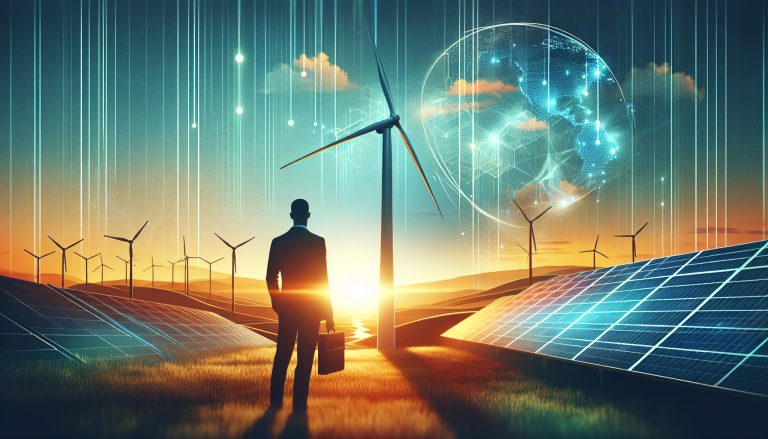The Future of Energy Business: Navigating Transformation and Innovation
In the rapidly evolving landscape of global energy, entrepreneurs and business leaders are witnessing an unprecedented era of transformation. The energy business is no longer just about traditional fossil fuels, but a complex ecosystem of innovation, sustainability, and technological advancement.
The Shifting Paradigm of Energy Dynamics
The global energy landscape is undergoing a radical metamorphosis. Traditional energy models are being challenged by emerging technologies, environmental concerns, and a growing demand for sustainable solutions. Entrepreneurs and business leaders who understand these shifts are positioning themselves at the forefront of a revolutionary industry.
“The future of energy is not about choosing between economic growth and environmental responsibility, but finding innovative ways to achieve both,” says Dr. Elena Rodriguez, a renowned energy policy expert.
Technological Disruption in Energy Business
Technological innovations are dramatically reshaping the energy sector. Artificial intelligence, blockchain, and advanced data analytics are transforming how energy is produced, distributed, and consumed. Smart grids, predictive maintenance, and real-time energy management are no longer futuristic concepts but current realities.
Companies like Tesla and Google’s parent company Alphabet are investing heavily in renewable energy technologies, demonstrating that cutting-edge innovation can drive sustainable business models. These organizations are proving that technological disruption can create significant economic value while addressing global environmental challenges.

Renewable Energy: The New Frontier
Renewable energy is not just an alternative; it’s becoming the primary strategy for forward-thinking energy businesses. Solar, wind, hydroelectric, and geothermal technologies are experiencing exponential growth. The cost of renewable energy production has dramatically decreased, making these technologies increasingly competitive with traditional fossil fuel-based systems.
Entrepreneurs are discovering lucrative opportunities in developing integrated renewable energy solutions. From residential solar installations to large-scale wind farms, the renewable energy sector offers multiple entry points for innovative business models.
Sustainable Business Strategies
Sustainability is no longer a peripheral concern but a core business strategy. Energy companies are increasingly evaluated not just on their financial performance but on their environmental and social impact. Investors, consumers, and regulatory bodies are demanding more transparent and responsible approaches to energy production.
Successful energy businesses are adopting circular economy principles, focusing on reducing waste, minimizing carbon footprints, and creating regenerative business models. This approach not only addresses environmental concerns but also creates long-term economic value.
Investment and Financing Trends
The financing landscape for energy businesses is evolving rapidly. Venture capital, green bonds, and impact investing are providing new funding mechanisms for innovative energy projects. Traditional financial institutions are increasingly recognizing the potential of sustainable energy investments.
Entrepreneurs in the energy sector must develop sophisticated financial strategies that balance risk, innovation, and long-term sustainability. Understanding complex funding ecosystems is crucial for success.
Regulatory Landscape and Policy Implications
Government policies and international agreements are playing a critical role in shaping the energy business environment. Carbon pricing, renewable energy incentives, and emissions regulations are creating both challenges and opportunities for energy entrepreneurs.
Successful businesses are those that can navigate these complex regulatory environments while maintaining innovative and adaptable strategies. Proactive engagement with policy developments is essential.
Skills and Competencies for Future Energy Leaders
The energy business demands a unique blend of technical expertise, strategic thinking, and interdisciplinary knowledge. Future leaders must be comfortable with technological complexity, understand environmental dynamics, and possess strong entrepreneurial skills.
Key competencies include:
– Advanced technological literacy
– Systems thinking
– Sustainability understanding
– Complex problem-solving
– Cross-cultural communication
– Adaptability and continuous learning
Global Perspectives and Emerging Markets
While developed economies are driving many energy innovations, emerging markets are presenting exciting opportunities. Countries in Africa, Southeast Asia, and Latin America are leapfrogging traditional energy infrastructure, implementing decentralized and renewable energy solutions.
Entrepreneurs who can develop context-specific energy solutions for these markets will find significant growth potential. Understanding local needs, technological constraints, and cultural dynamics is crucial.
Conclusion: Embracing Transformative Potential
The energy business is at a critical juncture. Technological innovation, environmental imperatives, and changing global dynamics are creating an unprecedented landscape of opportunity. Successful entrepreneurs will be those who can combine visionary thinking with practical implementation.
By embracing complexity, staying adaptable, and maintaining a commitment to sustainable innovation, energy business leaders can drive meaningful change while creating substantial economic value.
The journey ahead is challenging but immensely promising. Those who approach the energy business with creativity, resilience, and a holistic perspective will be the architects of our sustainable future.


